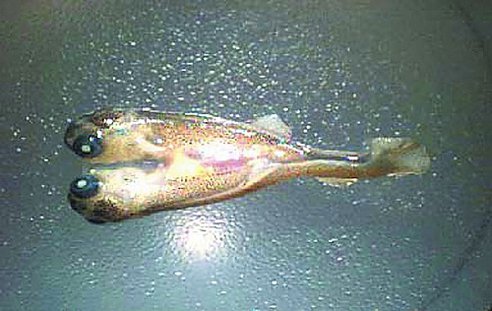Front Porch Blog

This two headed trout was deformed by selenium pollution. Today, we have taken action to keep EPA and Kentucky from allowing pollution like this to get worse.
Earlier today Appalachian Voices and a number of partner organizations sued the EPA over their approval of Kentucky’s new, weaker standard for selenium pollution.
Selenium is extremely toxic to fish, and causes deformities and reproductive failure at extremely low levels. The pollutant is commonly discharged from coal mines and coal ash ponds, but currently Kentucky does not regulate its discharge from these facilities.
These new standards were proposed at the behest of coal industry groups, likely motivated by citizen groups’ success at requiring companies in other states to clean up their selenium pollution. We have also seen the state governments of Virginia and West Virginia take steps towards making similar rollbacks to their own standards, making the EPA’s approval of Kentucky’s weakened standards even more alarming.
Kentucky is taking a standard generally know by scientists to be too weak already and making it even weaker. The state is changing the standard from 5 ug/L in water to 8.6 ug/g in fish tissue. A new study out this week, however, shows that selenium pollution is a problem at much lower levels (subscription required), 2.7 ug/L and 4 ug/g in fish tissue.
The new standard is significantly weaker than the previous standard, but the main problem is that the standard is no longer based on the amount of selenium in water but is now based on the amount of selenium in fish tissue. By making the standard fish tissue based Kentucky has made it extremely difficult to enforce.
Sampling fish tissue involves a more complex collection process and more expensive laboratory testing than collecting a water sample. Not only will mining companies and the laboratories that they employ have to implement additional testing procedures, but the state may have to do so as well. The complexity that this new rule adds is puzzling when you consider the limited resources of the underfunded and understaffed agency whose job it is to enforce it. And as cumbersome as fish tissue sampling may be for mining companies or the state, it will likely be impossible for citizens and citizen groups.
A fish tissue standard will be extremely difficult to apply to the real world, and it does not seem like the EPA or Kentucky has really thought through how it will actually work. One of the reasons we are suing is because of these real world application and enforcement problems. The EPA based its approval on a vague letter from Kentucky explaining how the state planned on dealing with one of the more challenging enforcement problems: how to enforce a fish tissue limit if all the fish in a given stream had already been killed. This letter is not part of the standard, however, and is thus unenforceable, so EPA should not have relied on it.
This action was filed in the U.S. District Court for the Western District of Kentucky. Sierra Club, Kentuckians For The Commonwealth, Appalachian Voices, and the Kentucky Waterways Alliance are represented in this case by Ben Luckett and Joe Lovett of Appalachian Mountain Advocates.
PREVIOUS
NEXT
Related News

Leave a comment
Your email address will not be published. Required fields are marked *

